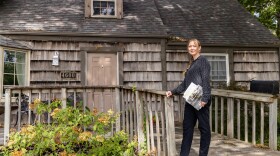Natalie Moore
Natalie Moore is WBEZ's South Side Reporter where she covers segregation and inequality.
Her enterprise reporting has tackled race, housing, economic development, food injustice and violence. Natalie’s work has been broadcast on the BBC, Marketplace and NPR’s Morning Edition, All Things Considered and Weekend Edition. Natalie is the author of The South Side: A Portrait of Chicago and American Segregation, winner of the 2016 Chicago Review of Books award for nonfiction and a Buzzfeed best nonfiction book of 2016. She is also co-author of The Almighty Black P Stone Nation: The Rise, Fall and Resurgence of an American Gang and Deconstructing Tyrone: A New Look at Black Masculinity in the Hip-Hop Generation.
Natalie writes a monthly column for the Chicago Sun-Times. Her work has been published in Essence, Ebony, the Chicago Reporter, Bitch, In These Times, the Chicago Tribune, the New York Times, the Washington Post and the Guardian. She is the 2017 recipient of Chicago Library Foundation’s 21st Century Award. In 2010, she received the Studs Terkel Community Media Award for reporting on Chicago’s diverse neighborhoods. In 2009, she was a fellow at Columbia College’s Ellen Stone Belic Institute for the Study of Women and Gender in the Arts and Media, which allowed her to take a reporting trip to Libya. Natalie has won several journalism awards, including a Casey Medal for Meritorious Journalism. Other honors are from the Radio Television Digital News Association (Edward R. Murrow), Public Radio News Directors Incorporated, National Association of Black Journalists, Illinois Associated Press and Chicago Headline Club. The Chicago Reader named her best journalist in 2017.
Prior to joining WBEZ staff in 2007, Natalie was a city hall reporter for the Detroit News. She has also been an education reporter for the St. Paul Pioneer Press and a reporter for the Associated Press in Jerusalem.
Natalie has an M.S.J. in Newspaper Management from the Medill School of Journalism at Northwestern University and a B.A. in Journalism from Howard University. She has taught at Columbia College and Medill. Natalie and her husband Rodney live in Hyde Park with their four daughters.
-
In the U.S., people spend billions on hair care products. Now, thousands of Black women have filed lawsuits against companies that sell chemical relaxers charging they bring risks of certain cancers.
-
Racial covenants made it illegal for Black people to live in white neighborhoods. Now they're illegal, but you might still have one on your home's deed. And they're hard to remove.
-
WBEZ's segregation and inequality reporter Natalie Moore remembers Chicago activist and historian Timuel Black, who died this week at the age of 102.
-
For decades, R&B singer R. Kelly dodged allegations of abuse toward Black women and girls. His guilty verdict has been a relief for those advocating for Black girls, especially in Chicago.
-
While black residents comprise 29% of Chicago, they represent 70% of that city's COVID-19 deaths. There are a number of reasons for that, and officials are just now beginning to address the issue.
-
No matter who wins, a black woman will make history by succeeding Rahm Emanuel as mayor of Chicago in Tuesday's election.
-
The University of Chicago's hospital will reopen the center on May 1. The move comes after years of pressure from young black activists, who mobilized when an 18-year-old died from gunshot wounds.
-
Lee's new film, Chiraq, draws on an ancient idea to deal with the present-day crisis of gun violence in Chicago. Natalie Moore of member station WBEZ explains how.
-
Bland, who was recently found dead in a Texas jail, received a funeral in her hometown of Lisle, Ill. Authorities released a preliminary autopsy ruling Bland's death a suicide; her family disagrees
-
Chicago has gathered for a parade to celebrate the Jackie Robinson West baseball team, which won the U.S. championship at the Little League World Series.




